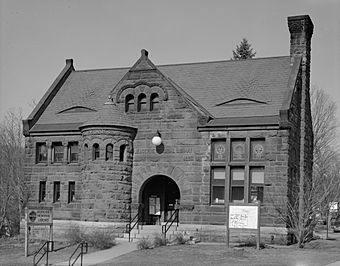Downtown Hardwick Village Historic District facts for kids
|
Downtown Hardwick Village Historic District
|
|

Jeudevine Memorial Library, HABS photo taken in 2006
|
|
| Location | Main, Church, Maple and Mill Sts., Hardwick, Vermont |
|---|---|
| Area | 35 acres (14 ha) |
| Architectural style | Greek Revival, Queen Anne, Late Victorian |
| NRHP reference No. | 82001698 (original) 04000161 (increase) |
Quick facts for kids Significant dates |
|
| Added to NRHP | September 30, 1982 |
| Boundary increase | March 10, 2004 |
The Downtown Hardwick Village Historic District is a special area in the heart of Hardwick, Vermont. It includes many old buildings that tell the story of the town. Hardwick started as a small industrial town in the 1800s. Later, it became famous for processing granite, a very hard stone. This historic district was added to the National Register of Historic Places in 1982. This means it's an important place to protect.
Contents
Hardwick's Early Days
Hardwick, Vermont, was first settled in 1781. The town government officially began in 1794. The village we know today as Hardwick started in 1795. A man named John Bridgman built a sawmill and a gristmill there. These mills were on the Lamoille River.
From South Hardwick to a Granite Hub
The village was first called South Hardwick. But it grew very important in the 1800s. So, its name was changed to just Hardwick. People started quarrying granite from the nearby hills in 1845. By 1911, Hardwick was home to the Woodbury Granite Company. This company was the largest granite processor in the world!
Exploring the Historic District
The main part of the historic district is on South Main Street. It stretches for one block between Wolcott and Main Streets. The district also goes north along Main Street. Then it extends east along Church and Maple Streets. It also reaches east along Mill Street.
Buildings and Styles in Hardwick
Some parts of the district have shops and businesses. Other areas have more homes. Many buildings from 1820 to 1860 are still standing. These often show the Greek Revival style of architecture. This style was very popular back then.
Other important building styles are from the 1870s. During this time, many Second Empire commercial buildings were built. You can also see examples of Late Victorian architecture. One of the most beautiful buildings is the Jeudevine Memorial Library. It was built in 1896.



